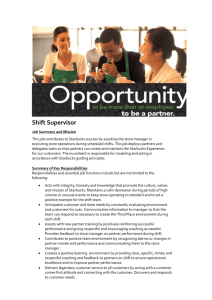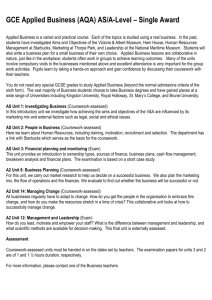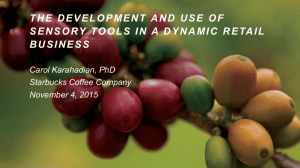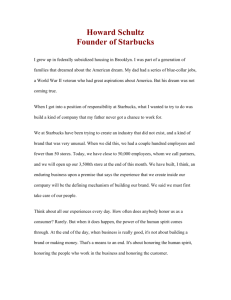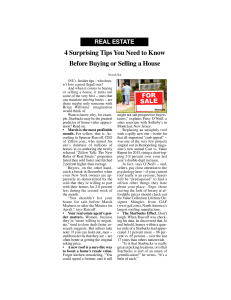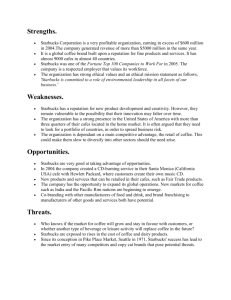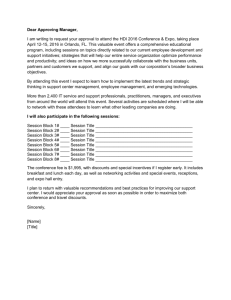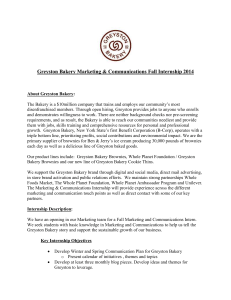Test of New Master
advertisement
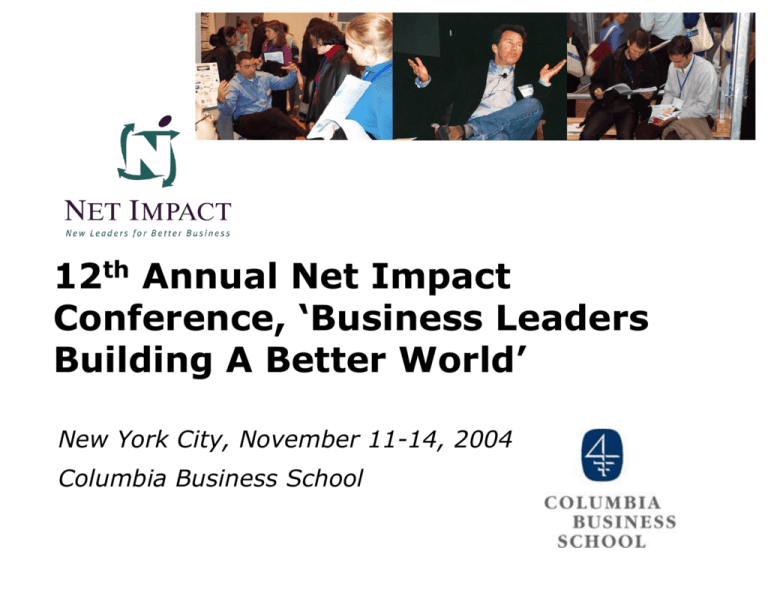
12th Annual Net Impact Conference, ‘Business Leaders Building A Better World’ New York City, November 11-14, 2004 Columbia Business School 2004 Conference Participation Registration growth Participant Breakdown Sponsors 20 In-Kind Donors 8 Business Expo Exhibitors 33 Speakers 216 MBA Students 969 Professional Attendees 442 Presenting Sponsors Booz Allen Hamilton Starbucks Coffee Company Kauffman Foundation The Coca-Cola Company Herman Miller Number of registrants 1,500 1,000 500 0 1993 1994 1995 1996 1997 19981999 2000 2001 2002 2003 2004 Select Business Expo Participants HP Honest Tea DuPont GE Wind Gap Inc. USAID Intel Corporation United eWay Calvert Foundation Teach for America Ford Motor Company The New York Times 2 Conference Reaction and Impact Take their word for it...testimonials from conference attendees “Amazing speakers on every panel I attended! High quality, very impressive, very professional.” “All in all, very impressive undertaking -- I left the conference with a renewed sense of optimism. Much much appreciated!” “I saw that the conference really invigorated people who had limited exposure to socially responsible business, microfinance, etc.” Fact: 87% of this year’s conference attendees indicated that they would be more likely to purchase products from a conference sponsor Fact: 94% of this year’s conference attendees indicated that a company’s support of Net Impact would positively influence their desire to work with that company 3 Content Curriculum Formats -Challenges and Innovation in Nonprofit Management and Community Development -Social Funding and Financing -Corporate Social Responsibility -Sustainable Solutions -Globalization and Emerging Markets -Social Entrepreneurship -Keynotes and Roundtables -Panels -Cases -Venture Labs -Interest Dinners -Edutainment -Case Competitions -Business Expo Presenters -CEOs -Social Entrepreneurs -CSR Professionals -Non-profit Executive Directors -Faculty -Consultants -Government officials -Authors and Journalists -Recruiters 4 Keynote: Orin C. Smith, President and CEO, Starbucks Coffee Company On Corporations: • “Corporations are operating in a way that is not sustainable for future generations and we will go so far that we cannot correct it – the clock is ticking. If everyone in the world consumed resources like we do in the western world we would need four more planets” On Consumers: • “As consumers we should not reward bad behavior – companies that act socially irresponsibly are not going to stop if we reward them in the marketplace. We cannot sit on the sidelines – we need to change ourselves first” On Corporate Social Responsibility: • “CSR is broader than philanthropy and sustainability goes beyond CSR from a social, economic and environmental standpoint. At the point we’re at now, we’ve made a hole and we need to fill the deficit” On Starbucks: • “Due to the fact that Starbucks treats their employees well, 73% are engaged. Starbucks consumers pay more for service which is passed on to employees in the form of higher wages and healthcare. Starbucks are also able to pay the farmers more. They demand transparency in their supply chain and demand that all elements of the chain demonstrate that the money gets to the farmer. They can audit their supply chain and ensure that they comply with humanitarian regulations in the country they’re in” Keynote: Julius Walls Jr., President and CEO, Greyston Bakery On Mission: • “The Greyston Bakery is a $5-million-a year-business. But the bakery doesn't hire people to make cakes. It makes cakes to hire people like Rodney Johnson, a former drug dealer. He got his GED in jail and his first legal job at Greyston” On Charity vs. Business: • “Running a profitable business is a better way to do good works than running a charity” On a Double Bottom Line: • “Do good and do well. It's called a double bottom line. Our social mission is as important as our business mission. Our people are as important as the dollars we make” CEO Roundtable Gary Erickson, Clif Bar Tom Chappell, Tom’s of Maine Jeffrey Hollender, Seventh Generation On Ownership: • “You can choose to run a company based on values if you have majority voting, but with minority voting or with public shareholders, you are subject to external pressures. The track record of large companies acquiring small, values-based companies has proven problematic. Values do not “trickle up” to infuse the larger company” – Gary Erickson On True Costs: • “If you had to incorporate external costs into the price of a product (i.e.— pollution) then sustainably made products would be cheaper than the rest of the market option—unfortunately our system does not force companies to account for externalities” – Jeffrey Hollender On Values: • Teach values to your employees and know thyself. - Tom Chappell The Net Impact Conference Attendee Educated Motivated Inspired Engaged Networked
